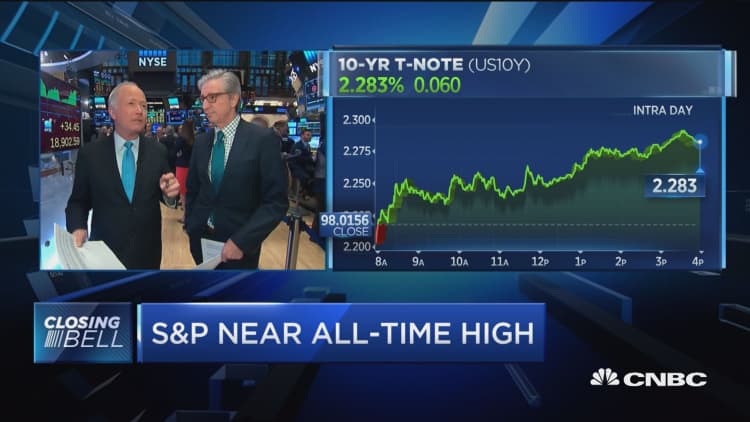
The major indexes are floating near new highs, but that may not be what investors want.
Here's one stat that really caught my attention today: The American Association of Individual Investors (AAII) Individual Investor Sentiment Survey spiked to its highest level in a year.
Why am I alarmed to hear that retail investors are getting really bullish? Because one of the best friends the market rally has had in the last few years has been the high level of investor skepticism. Let's face it — everyone hated the rally. High skepticism means a lot of people stay away from stocks.
That now appears to be diminishing, and we might want to be concerned. Fellow market watcher Paul Hickey from Bespoke is concerned, as well.
"In the near term, that might mean a continuation of the rally as money flows into equities, but as a contrarian indicator, euphoria is not what you want to see," he said.
Amen.
The Dow industrials, S&P 500, NASDAQ. and S&P 400 Mid-Cap are all near historic highs. It comes at the same time as broadening retail euphoria.
Yikes!
Three factors are moving the markets:
- The economic news is getting better. Jobless claims are at a four-decade low. Housing starts came in well above expectations, at the highest levels since 2007. CPI is on solid footing, neither too hot nor too cold. GDP is on pace to post its strongest quarterly reading in nearly two years. Retail sales were stronger than expected.
- The chatter has been more upbeat, with Fed officials insisting the time has come to start raising rates again.
- The Trump victory has come embedded with a set of expectations. The S&P has rallied 2.6 percent in seven trading sessions on vague hopes of a sizable stimulus program, a reduction in regulations and a reduction in the tax rate for corporations and individuals. Even the reality of higher interest rates is based on inflation expectations that may or may not come to pass, in addition to a Fed rate hike.
Is it all too far too fast? December is traditionally a bullish month, but are we setting ourselves up for a disappointment?
So far all we are getting is an expansion in the multiple. We have neither seen notable earnings gains nor are analysts moving earnings estimates up on the Trump rally yet.
Regardless, the market is certainly not cheap, but it's not dramatically overpriced, either. The S&P is trading at a multiple of 18.5 based on full-year 2016 estimates of $118.18, according to Thomson Reuters. It was roughly 18 before the election.
That's high, but on a forward basis, it's more reasonable, at 16.5 times full-year 2017 estimates of $132.56. The historic average is close to 15 for forward estimates. So it's still on the high side.
What could go wrong with this? First off, the market rally is not as broad as it looks. There are a few big winners and a bunch of losers.
Small caps have notably outperformed big caps. Banks, construction and engineering, and steel stocks have been notable gainers. Utilities, gold, consumer staples, real estate, hospitals, emerging markets and internet and social media have all dropped.
Other obvious warning signs have surfaced:
- Dollar strength is being ignored,
- The Fed will almost certainly raise rates in December, since it has better growth and the perfect cover of fiscal stimulus.
- The market is completely ignoring the dark side of the Trump rhetoric around trade. Michael O'Rourke at Jones Trading is one of many traders who have been amazed by this. "President-elect Trump has emphasized nationalist and protectionist policies. It is amazing that the US equity market is assuming that such policies will be enacted and US economic growth will be fostered, jobs will be created and corporate profits will be sustained," he said.
- The biggest risk is that expectations will not be fulfilled to the extent expected. The stimulus will not be as big as the market is pricing, the tax reductions not as great and the regulatory reform will take much longer than expected.
Piper Jaffray was one of several firms that has begun downgrading bank stocks recently for exactly this reason.
"At current valuations, we believe RF [Regions Financial] (and bank stocks in general) are at risk of a meaningful pullback if soft economic data were to temper rate expectations or Congressional partisanship deflates the regulatory euphoria the market is expecting under the Trump administration," the firm said.
Don't get me wrong. There's a lot I like here. The earnings recession is over. The economic news is better. There are prospects for somewhat higher growth, with higher interest rates.
But the market is at historic highs on exactly these expectations.
Here's Michael O'Rourke again: "It will be interesting to see if the euphoria around the market outlook is sustained. If it isn't, it will be a market head fake of historic proportions."


